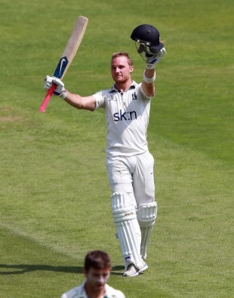Tags
Ateeq Javid, cricket, Edgbaston, George Dockrell, Ian Westwood, Laurie Evans, Marcus Trescothick, Paul Edwards, Peter Trego, Piyush Chawla, Recordo Gordon, Somerset, Steve Kirby, Suites for Unaccompanied Violoncello, Taunton, Varun Chopra, Warwickshire

Laurie Evans
Cricket coaches rather like quiet batsmen. By this they do not mean those who sit silently in the corner of the changing room listening to Bach’s Cello Suites [BWV 1007-12]; rather, they are referring to those unflamboyant players whose acquisition of runs is so gentle as to be almost unnoticed until one finds that they have thirty or forty to their credit. On this evidence, Warwickshire’s Laurie Evans is, to some degree at least, a quiet batsman, but he also showed himself capable of being an impressively expansive one.
In company with Ateeq Javid, who is hardly a rabble-rouser, Evans added an unbroken 245 runs for the fourth wicket to restore his team’s fortunes after they had slipped to thirty-eight for three in the first session of the second day. “All day Bears!” roared a home supporter from the Edgbaston pavilion and, to uninitiates, this yell suggested some sort of CBeebies marathon. “All day Laurie,” he shouted a few moments later, and Laurie carried out his injunction to the letter.
By the close, Evans had made his second century in little more than a month of what is proving to be a breakthrough season for him and Javid his maiden first-class hundred. The pair have built a foundation from which the home side can establish a decisive first-innings lead and it was noticeable how each man constructed his innings as conditions eased during the day. Evans, for example, hit just seven fours in his 127-ball half-century but stroked another ten boundaries in getting to a hundred, which came off only sixty-four further deliveries.
“I knew Ateeq was going to get to his hundred,” said Evans, who had leapt with delight when Javid reached three figures. “I’m really happy for him. We’re new on the scene and we help each other out along the way.”
“You train all your life to get your maiden first-class hundred,” Javid said, “and this just shows that the hard work has paid off. Tomorrow we’ve got a big job to do because we can put our side in a winning position. Somerset bowled very well with the new ball and Steve Kirby did really well from one end. It was just a case of staying in there and realizing that there was going to be a release ball.”
Apart from the excellent Kirby, most of Somerset’s bowling responsibilities were entrusted to the spinners George Dockrell and Piyush Chawla, whose efforts were contrasting. Dockrell was impressive; an admittedly rusty Chawla was not. Even if one allows the Indian the degree of license normally given to legspinners his bowling before tea merely allowed Javid and Evans to milk him with ease. Conceding fifty-five runs in thirteen overs is unlikely to impress Marcus Trescothick.
If Chawla bowls like that at Taunton he will disappear into the Tone at one end and either the churchyard or the splendid sandwich bars at the other. In fairness, he managed a little more accuracy after tea but his analysis still compares unfavorably with Dockrell, whose first eighteen overs cost a niggardly twenty-three runs. By the close Dockrell had conceded sixty-two runs in twenty-eight overs while Chawla had gone for seventy-seven in twenty. Neither, though, was as economical as Kirby whose twenty overs cost just thirty-seven runs and whose spell with the second new ball tested both batsmen.
Kirby, who is one of the most competitive cricketers on the circuit, can also be praised, along with all his team-mates, for congratulating both centurions when the serious business of the day was done. That’s the way to play this game.
By the close Somerset’s hopes of achieving only their second win at Edgbaston in sixteen attempts spanning twenty-nine years were receding very rapidly. Indeed, Trescothick’s players were looking back fondly on a first session in which Peter Trego had removed Ian Westwood for eight and Dockrell had claimed the wickets of both nightwatchman Recordo Gordon and Warwickshire captain Varun Chopra for thirteen apiece.
Gordon, who bats No. 11 for the second team, resisted stoutly against the new ball for seventy-two minutes but even his efforts paled when compared with Evans and Javid’s careful forbearance and well-judged aggression over the next two sessions. The pair’s chanceless partnership may yet prove to have been vital if Warwickshire manage to defend their title over the last month of a season in which so many issues await resolution.
Paul Edwards – ESPN Sports Media Ltd.
